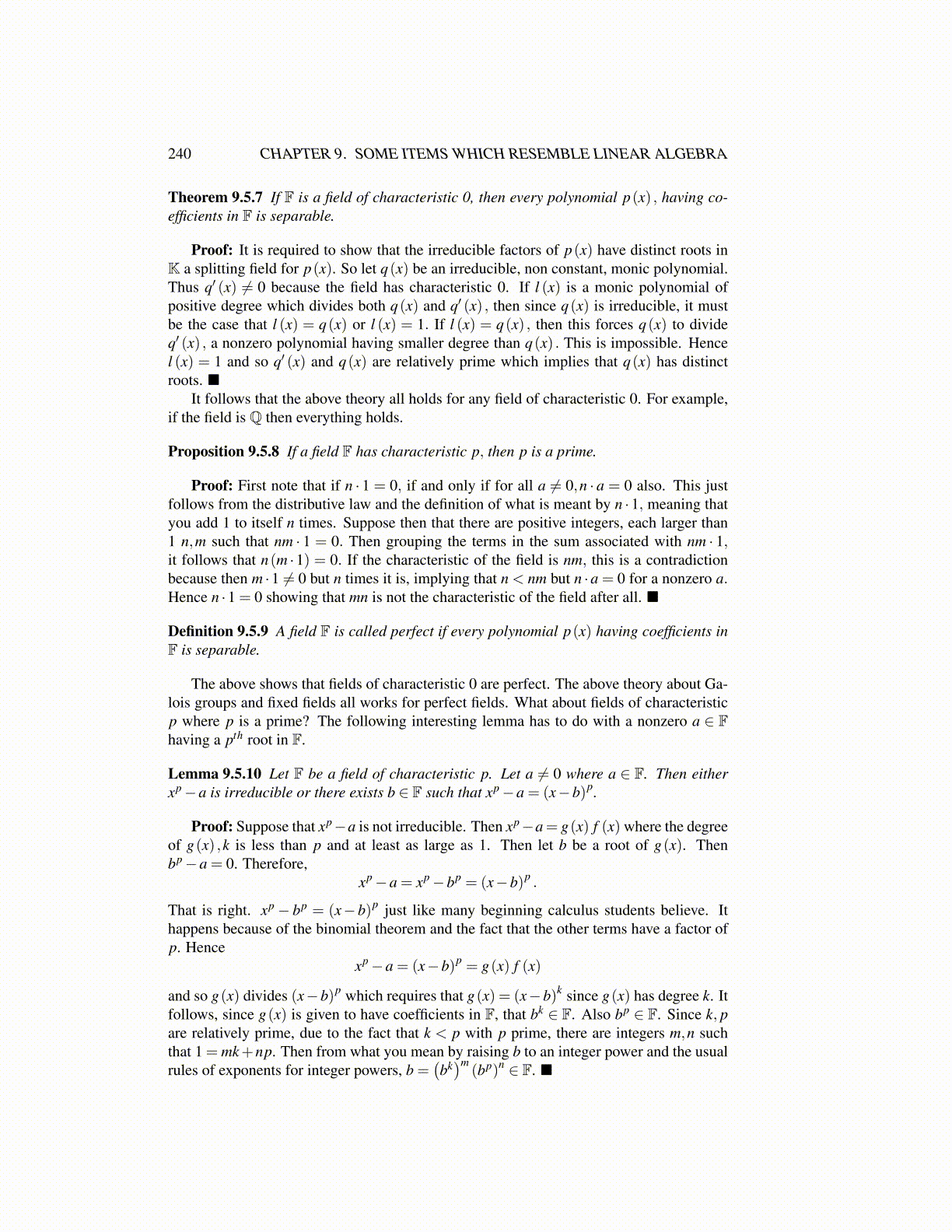
240 CHAPTER 9. SOME ITEMS WHICH RESEMBLE LINEAR ALGEBRA
Theorem 9.5.7 If F is a field of characteristic 0, then every polynomial p(x) , having co-efficients in F is separable.
Proof: It is required to show that the irreducible factors of p(x) have distinct roots inK a splitting field for p(x). So let q(x) be an irreducible, non constant, monic polynomial.Thus q′ (x) ̸= 0 because the field has characteristic 0. If l (x) is a monic polynomial ofpositive degree which divides both q(x) and q′ (x) , then since q(x) is irreducible, it mustbe the case that l (x) = q(x) or l (x) = 1. If l (x) = q(x) , then this forces q(x) to divideq′ (x) , a nonzero polynomial having smaller degree than q(x) . This is impossible. Hencel (x) = 1 and so q′ (x) and q(x) are relatively prime which implies that q(x) has distinctroots. ■
It follows that the above theory all holds for any field of characteristic 0. For example,if the field is Q then everything holds.
Proposition 9.5.8 If a field F has characteristic p, then p is a prime.
Proof: First note that if n · 1 = 0, if and only if for all a ̸= 0,n · a = 0 also. This justfollows from the distributive law and the definition of what is meant by n ·1, meaning thatyou add 1 to itself n times. Suppose then that there are positive integers, each larger than1 n,m such that nm · 1 = 0. Then grouping the terms in the sum associated with nm · 1,it follows that n(m ·1) = 0. If the characteristic of the field is nm, this is a contradictionbecause then m ·1 ̸= 0 but n times it is, implying that n < nm but n ·a = 0 for a nonzero a.Hence n ·1 = 0 showing that mn is not the characteristic of the field after all. ■
Definition 9.5.9 A field F is called perfect if every polynomial p(x) having coefficients inF is separable.
The above shows that fields of characteristic 0 are perfect. The above theory about Ga-lois groups and fixed fields all works for perfect fields. What about fields of characteristicp where p is a prime? The following interesting lemma has to do with a nonzero a ∈ Fhaving a pth root in F.
Lemma 9.5.10 Let F be a field of characteristic p. Let a ̸= 0 where a ∈ F. Then eitherxp−a is irreducible or there exists b ∈ F such that xp−a = (x−b)p.
Proof: Suppose that xp−a is not irreducible. Then xp−a= g(x) f (x) where the degreeof g(x) ,k is less than p and at least as large as 1. Then let b be a root of g(x). Thenbp−a = 0. Therefore,
xp−a = xp−bp = (x−b)p .
That is right. xp− bp = (x−b)p just like many beginning calculus students believe. Ithappens because of the binomial theorem and the fact that the other terms have a factor ofp. Hence
xp−a = (x−b)p = g(x) f (x)
and so g(x) divides (x−b)p which requires that g(x) = (x−b)k since g(x) has degree k. Itfollows, since g(x) is given to have coefficients in F, that bk ∈ F. Also bp ∈ F. Since k, pare relatively prime, due to the fact that k < p with p prime, there are integers m,n suchthat 1 = mk+np. Then from what you mean by raising b to an integer power and the usualrules of exponents for integer powers, b =
(bk)m
(bp)n ∈ F. ■